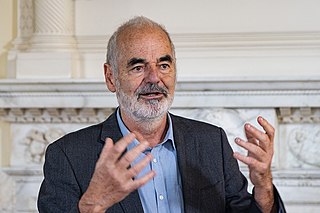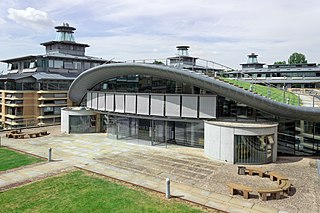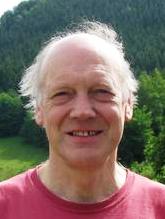Peter Whittle was a mathematician and statistician from New Zealand, working in the fields of stochastic nets, optimal control, time series analysis, stochastic optimisation and stochastic dynamics. From 1967 to 1994, he was the Churchill Professor of Mathematics for Operational Research at the University of Cambridge.

Sir David John Spiegelhalter is a British statistician and a Fellow of Churchill College, Cambridge. From 2007 to 2018 he was Winton Professor of the Public Understanding of Risk in the Statistical Laboratory at the University of Cambridge. Spiegelhalter is an ISI highly cited researcher.

The Faculty of Mathematics at the University of Cambridge comprises the Department of Pure Mathematics and Mathematical Statistics (DPMMS) and the Department of Applied Mathematics and Theoretical Physics (DAMTP). It is housed in the Centre for Mathematical Sciences site in West Cambridge, alongside the Isaac Newton Institute. Many distinguished mathematicians have been members of the faculty.

David George Kendall FRS was an English statistician and mathematician, known for his work on probability, statistical shape analysis, ley lines and queueing theory. He spent most of his academic life in the University of Oxford (1946–1962) and the University of Cambridge (1962–1985). He worked with M. S. Bartlett during World War II, and visited Princeton University after the war.

Francis Patrick Kelly, CBE, FRS is Professor of the Mathematics of Systems at the Statistical Laboratory, University of Cambridge. He served as Master of Christ's College, Cambridge from 2006 to 2016.

Peter Gavin Hall was an Australian researcher in probability theory and mathematical statistics. The American Statistical Association described him as one of the most influential and prolific theoretical statisticians in the history of the field. The School of Mathematics and Statistics Building at The University of Melbourne was renamed the Peter Hall building in his honour on 9 December 2016.
The Churchill Professorship of Mathematics of Information is a professorship in the mathematics of information at the University of Cambridge. It was established in 1966 by a benefaction from Esso in memory of Sir Winston Churchill, who died the previous year, for the promotion of the study of operations research. This was the second professorship established within the Cambridge Statistical Laboratory.
Richard Robert Weber is a mathematician working in operational research. He is Emeritus Churchill Professor of Mathematics for Operational Research in the Statistical Laboratory, University of Cambridge.

Geoffrey Richard GrimmettOLY is an English mathematician known for his work on the mathematics of random systems arising in probability theory and statistical mechanics, especially percolation theory and the contact process. He is the Professor of Mathematical Statistics in the Statistical Laboratory, University of Cambridge, and was the Master of Downing College, Cambridge, from 2013 to 2018.

James Ritchie Norris is a mathematician working in probability theory and stochastic analysis. He is the Professor of Stochastic Analysis in the Statistical Laboratory, University of Cambridge.
Rollo Davidson was a probabilist, alpinist, and Fellow-elect of Churchill College, Cambridge, who died aged 25 on Piz Bernina. He is known for his work on semigroups, stochastic geometry, and stochastic analysis, and for the Rollo Davidson Prize, given in his name to early-career probabilists.

Sourav Chatterjee is an Indian Bengali mathematician from West Bengal, specializing in mathematical statistics and probability theory. Chatterjee is credited with work on the study of fluctuations in random structures, concentration and super-concentration inequalities, Poisson and other non-normal limits, first-passage percolation, Stein's method and spin glasses. He has received a Sloan Fellowship in mathematics, Tweedie Award, Rollo Davidson Prize, Doeblin Prize, Loève Prize, and Infosys Prize in mathematical sciences. He was an invited speaker at the International Congress of Mathematicians in 2014.
Gareth Owen Roberts FRS FLSW is a statistician and applied probabilist. He is Professor of Statistics in the Department of Statistics and Director of the Centre for Research in Statistical Methodology (CRiSM) at the University of Warwick. He is an established authority on the stability of Markov chains, especially applied to Markov chain Monte Carlo (MCMC) theory methodology for a wide range of latent statistical models with applications in spatial statistics, infectious disease epidemiology and finance.
John Charles Gittins is a researcher in applied probability and operations research, who is a professor and Emeritus Fellow at Keble College, Oxford University.

Martin Thomas Barlow FRS FRSC is a British mathematician who is professor of mathematics at the University of British Columbia in Canada since 1992.
Terrence L. Fine was an American scientist, engineer and philosopher. He is known especially for his contributions to the defense and development of alternatives to the classical calculus for probabilistic modeling and decision-making. Other contributions include Fine's theorem, the Fine numbers and the Fine–McMillan quantizer. He was the recipient of the first patent awarded in the area of statistical delta modulation.
The Thomas Bond Sprague Prize is a prize awarded annually to the student or students showing the greatest distinction in actuarial science, finance, insurance, mathematics of operational research, probability, risk and statistics in the Master of Mathematics/Master of Advanced Studies examinations of the University of Cambridge, also known as Part III of the Mathematical Tripos. The prize is named after Thomas Bond Sprague, the only person to have been president of both the Institute of Actuaries in London and the Faculty of Actuaries in Edinburgh. It is awarded by the Rollo Davidson Trust of Churchill College, Cambridge, following a donation by D. O. Forfar, MA, FFA, FRSE, former Appointed Actuary of Scottish Widows.

Bruce Edward Hajek is a Professor in the Coordinated Science Laboratory, the head of the Department of Electrical and Computer Engineering, and the Leonard C. and Mary Lou Hoeft Chair in Engineering at the University of Illinois Urbana–Champaign. He does research in communication networking, auction theory, stochastic analysis, combinatorial optimization, machine learning, information theory, and bioinformatics.
Vivek Shripad Borkar is an Indian electrical engineer, mathematician and an Institute chair professor at the Indian Institute of Technology, Mumbai. He is known for introducing analytical paradigm in stochastic optimal control processes and is an elected fellow of all the three major Indian science academies viz. the Indian Academy of Sciences, Indian National Science Academy and the National Academy of Sciences, India. He also holds elected fellowships of The World Academy of Sciences, Institute of Electrical and Electronics Engineers, Indian National Academy of Engineering and the American Mathematical Society. The Council of Scientific and Industrial Research, the apex agency of the Government of India for scientific research, awarded him the Shanti Swarup Bhatnagar Prize for Science and Technology, one of the highest Indian science awards for his contributions to Engineering Sciences in 1992. He received the TWAS Prize of the World Academy of Sciences in 2009.

Ivan Zachary Corwin is a professor of mathematics at Columbia University.











